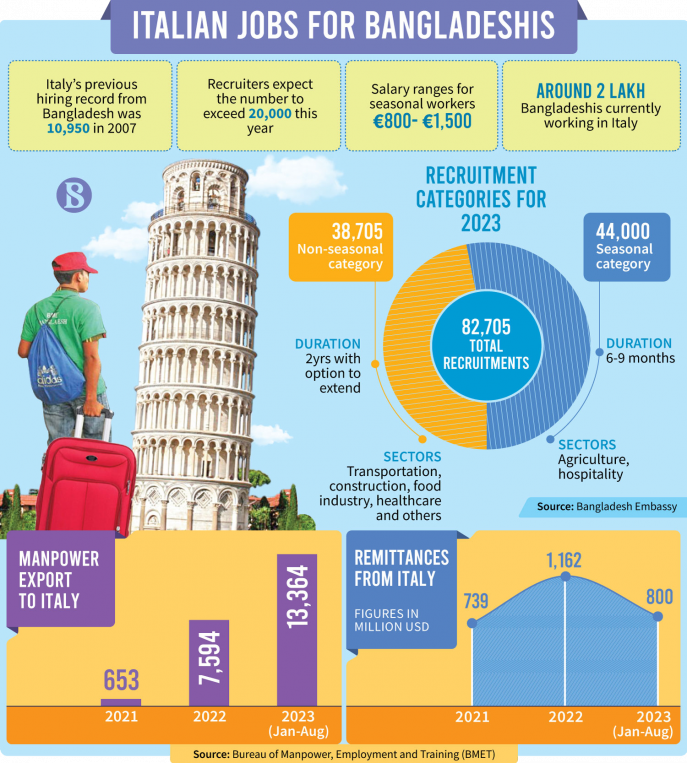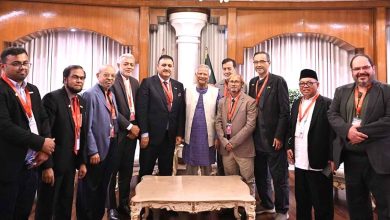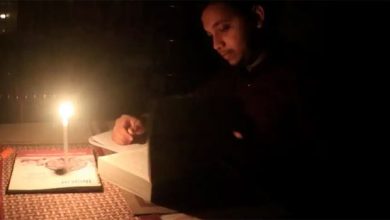Record Bangladeshis hired in Italy this year, $800m sent home
Industry insiders believe the increasing number of regular migrations would help to combat irregular ones as many lose their lives in the Mediterranean Sea each year while trying to reach Italy through illegal processes

Italy, one of the more lucrative destinations for South Asian workers, is recruiting a record number of workers this year from Bangladesh, especially in agricultural farming, hospitality and manufacturing sectors.
Around 14,434 workers have been employed in various industries in Italy from Bangladesh till 20 September 2023, already the highest in a single year, according to the Bureau of Manpower, Employment and Training (BMET).
The Mediterranean nation in 2023 is hiring a total of 82,705 seasonal and non-seasonal workers from 33 non-EU countries, including Bangladesh.
Seasonal workers are usually employed in agriculture or hospitality sectors, while non-seasonal hires are as housekeeper, ship breaker, salesman, nurse, black smith, auto electrician, lab technician, driver, cleaner, welder, construction worker, plumber and caretaker.
Industry insiders believe the increasing number of regular migrations would help to combat irregular ones as many lose their lives in the Mediterranean Sea each year while trying to reach Italy through illegal processes.
Bangladeshi workers are known for their diligence and quick uptake of job opportunities abroad, Asif Anam Siddique, first secretary (Labour), Bangladesh Embassy in Rome, told The Business Standard.
“Their presence in Italy, along with their strong network, plays a significant role in facilitating the recruitment of new workers,” he added.
Bangladeshi expatriates in Italy sent $800 million remittance in the first eight months of 2023.
Complains of high cost
However, workers have complained that they had spent as high as Tk15 lakh for migration cost when it should not be more than Tk2-Tk2.5 lakh.
“Italian authorities do not indicate any migration cost. There is a €16 cost as a government revenue stamp. Visa application and air fare should be borne by applicants,” Asif Anam Siddique said.
However, acknowledging the allegations, the diplomat explained, “A group is exploiting the visa process, which requires a third party as personal reference.”
This requirement of reference is leading to third-parties raking in huge sums of money, he added.
Shamim Ahmed Chowdhury Noman, former secretary general of Bangladesh Association of International Recruiting Agency (Baira) told that though a number of recruiting agencies are involved in sending workers to Italy.
He, however, was not aware of the high migration cost.
Visa categories
Under the seasonal workers programme, a worker is allowed to stay for 6-9 months in Italy during a season to work in an agriculture or hospitality sector.
However, Bangladeshi farm workers violated conditions of the programme by not returning home after each season, prompting Italy to strip Bangladesh of the privilege in 2012.
The workers who overstayed their visa duration claimed they could not earn sufficient in such a short period against what they paid to recruiting agencies.
On 12 October 2020, Italy cleared the way for Bangladeshi seasonal workers of Bangladesh, along with several others, by enlisting it on the “Decreto Flussi” — a specific quota issued by Italy every year for non-European Union (EU) citizens allowed to work in the country.
This year, there are 44,000 seasonal visas available for citizens of non-EU countries, with an additional 38,705 visas allocated for non-seasonal worker hires.
The duration of non-seasonal visa is two years with an option for extension.
How workers can go to Italy
Italian authorities will sort applications received by 31 December 2023 and select the eligible ones.
In Italy’s hiring process, the employer initiates by requesting a No-Objection Certificate (NOC known as Nulla Osta) from the local DC office using their designated email address.
The NOC includes the candidate’s name and passport number. Once issued, the employer sends it to the prospective worker in Bangladesh, who then applies for an Italian visa at the embassy, attaching the NOC.
Upon arrival in Italy with a visa, the worker, along with the employer, signs an employment contract at the local DC office, accompanied by a €16 government-prescribed revenue stamp payment.
For those utilising the help desk for application submission, a maximum fee of up to €300 may apply, but there are no other costs involved in the application process.





